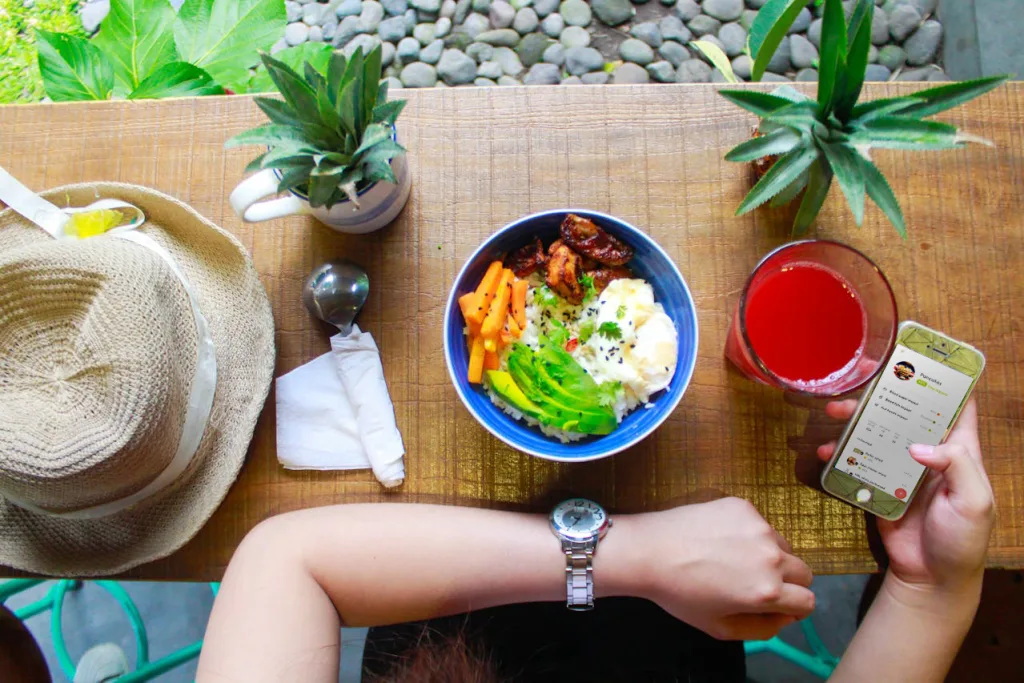Introduction to the Zoe App
Imagine a world where your next meal plan is designed not by a dietitian but by an app measuring your body’s unique food responses. Sounds amazing, right? Welcome to the era of personalized nutrition with technology like Zoe App!
From the comfort of your home, you can analyse your gut health, monitor your blood sugar, and get insights into your blood fats. These personalised nutrition apps are not just about counting calories or tracking steps; they’re about understanding your body’s response to specific foods; amazing right?
But as we send out the samples to personalised nutrition Zoe App, we must ask ourselves: are these tech solutions the innovations we’ve been waiting for in the nutrition field, or do they make us more obsessed and anxious about our food?
Let’s explore the Zoe App to determine whether it is worth spending time and money on personalised nutrition and answer the question of whether Zoe is worth it.
How Much Does Zoe Health Cost In The UK?
To start, you first need to buy a Zoe test kit. Zoe App team will test your gut health, blood sugar, and blood fat- all Zoe tests will cost you £259. The price looks pretty reasonable compared to other testing kits, but after your tests, you have to choose one of three membership plans to receive the personal plan and support on the Zoe app that costs:
- A 1-month plan on the Zoe app costs – £59.99 per month
- The 4-month plan on Zoe costs – £34.99 per month (upfront £139.96).
- The 12-month plan on the Zoe app costs- £24.99 per month (upfront £299.88).
The Promise of Personalized Nutrition:
The tests:
1. Understanding your gut health: Analysing your stool sample shows your digestive health insights, the diversity of your gut microbiome, and how it affects your overall well-being.
2. Real-Time Blood Sugar Insights: Imagine knowing how your body reacts to sugar and carbohydrates in real-time. With Zoe’s continuous glucose monitor, you can see how foods affect your blood sugar. But you only need to wear the monitor for two weeks.
3. Understanding Blood Fats: By sending a small blood sample to Zoe’s labs, you can get a detailed analysis of your blood fats. This information can be very beneficial in understanding your risk for heart disease and crafting a diet that supports heart health.
The Personalised nutrition membership:
After you get your results back, Zoe’s team will teach you how to swap, add and combine foods so you can eat in the best way for you and your body.
What do users say?
While scrolling through user reviews on Trustpilot and the App Store, I found many good reviews, and people find the Zoe app very helpful. Of course, there are also frustrated users. Most of the frustration people expressed was over the cost and buggy technology.
Looking at influencer reviews on YouTube, I noticed similar positives and negatives highlighted multiple times. People love looking into extensive amounts of data specific to you. Zoe app helps you make small changes and swaps that help you avoid unhealthy foods.
However, as both influencers mentioned, the program does not account for allergies or food intolerances, such as nut allergies or IBS, which makes personalised nutrition less personalised.
Reviews highlighted that there is no after-test to see if your gut microbe has improved after a while. I did, however, see on their website that you can retest your gut to see how your microbiome has improved; I suppose this will come with additional cost.
Influencers and users emphasised the negative aspects of the Zoe app, such as the cost and time needed to log everything. (3) (4).
Who are the People behind the Zoe App?
Professor Tim Spector, MD FRCP FRSB, and Sarah Berry, PhD lead the team and the product. They both are well respected in the nutrition field and are doing amazing work to educate people about nutrition. They have half a million subscribers to their Zoe YouTube channel, where they share many nutrition tips and bring in more experts as guests.
My personal view on Zoe APP:
I have not used the Zoe App myself, therefore my opinion about it is based only on research. I would love to test it for a more accurate review, but the price tag is too high (it would be great to receive a sample 😏).
As much as I see the potential and excitement in tracking your glucose levels and understanding your microbiome and blood fat, I am a bit sceptical.
My scepticism started when I Grabbed Tim Spectors’ book ‘Spoon-Fed’ at the airport a few months ago. I felt the text was vague and light in detail, did not teach me anything I didn’t already know, and felt more like an Ad for the Zoe app than a research and science-based book.
I like watching Dairies of CEO, but when I saw that Steven Bartlett was investing in Zoe app and is now the face of the personalised nutrition app, it started to feel a bit too commercialised. Did Steven Bartlett suggest their Zoe podcast as a marketing tool, I wonder?
The biggest red flag I found so far is a lack of transparency:
Their claims about the results of using Zoe: 70% have more energy, “85% improved their gut health”, and 74% say that ZOE is a more sustainable way of eating than dieting’ is drawn from an unpublished internal study of 450 people, not a scientific study. By now, they have gathered so much data and surely could provide more comprehensive numbers. (6)
Have a look at this video; I found it quite interesting:
Is Personalization Going Too Far? And how personalised is it?
While the benefits sound promising, there’s a flip side to consider.
Tracking Glucose can be beneficial and insightful. But many people can fixate on the numbers and start eliminating foods they think are “bad for them”. For more sensitive people or users who have an unhealthy relationship with food, tracking glucose levels after each meal can create food anxiety and stress. Blood glucose can also be affected by other factors, such as lack of sleep, smoking, menstrual cycle, and stress. Of course, food is one of the most significant factors and can undoubtedly help understand the spikes, but it is not the whole picture.
Instead of glucose monitoring for two weeks, repeated monitoring every three months or so would be more beneficial, but this would become very expensive.
Understanding your gut health is essential, and we are learning more and more about it. But how personalised gut health can be? Would the same foods increase good bacteria, for some people and increase bad bacteria for others? So, should eating more fermented foods, vegetables, and legumes and reducing ultra-processed food and meat apply to everyone? What I am saying is that the same foods increase or decrease bad bacteria in our gut, so do we need personalisation?
Understanding Blood Fats is also great, as the Zoe app can show underlying conditions that can be adjusted with changes in diet and lifestyle. We all can benefit from understanding how quickly our bodies get rid of fat. Still, we all can also benefit from a heart-healthy diet rich in fruit and vegetables, whole grains, pulses, nuts, seeds, and vegetable proteins and reduced saturated fat intake (2).
Main disadvantages of personalised nutrition apps:
1. Risk of Misinterpretation:
Interpreting the results of these tests can be daunting without proper context, medical guidance, or an appropriate understanding of nutrition. There’s a risk of unnecessary worry about normal variations in gut health, blood sugar, and blood fats.
Weighing and logging the food accurately is very time-consuming and inaccurate and can affect the scores as well.
2. The Cost Barrier:
Most people who need this kind of personal nutritional guidance cannot afford the Zoe app. Is personalised nutrition only for those who can afford it, and does this widen the health gap?
3. Psychological Impacts:
For some users, closely monitoring diet and health metrics can lead to obsessive behaviours or anxiety about food and nutrition (5).
4. Not that personalised:
At this point, Zoe needs to be more personalised, as the recommendations are only based on three factors, excluding vitamin deficiency allergies, food intolerances, exercise, and sleep (collaboration with Woop, maybe 🙂 ?).
Main advantages of personalised nutrition app Zoe:
- Many users seem to gain knowledge and understanding about the food they should or should not eat. Logging everything in the app gives you a push to eat healthier food.
- Even if it is costly, it is still less expensive than a private nutritionist. Many reviews rave about the support team’s professionalism and help in understanding the data.
- Some might not like it, but gamification and making nutrition more fun is are great way to build healthy habits. I like that Zoe is not about calorie counting but more about healthy food choices.
Conclusion: Is Zoe Health Worth it?
I think the work they do at Zoe will reveal many interesting insights that we haven’t had before, and I am excited about the comprehensive research done in the nutrition field. However, I do see a few red flags, like a lack of transparency, not focusing on the whole picture, and other aspects of lifestyle that could impact some of the results.
Is Zoe worth it ? Do we need personalised nutrition? Some of us who love tracking numbers and creating plans can benefit. People who are at the beginning of the nutrition journey and have no idea where to start will find getting the tests done and using the app for a few months useful.
But if you have an unhealthy relationship with food. If you listen to your body and eat healthy already, you might spend £600 and buy some nutritious food or get the blood test done instead.
As much as AI and algorithms are the future, the more we rely on algorithms to tell us what to eat, the more we stop listening to our bodies.
What do you think about personalised nutrition? Will you be joining Zoe App?
If you enjoyed reading about the Zoe App, you might also want to read the YUKA APP REVIEW.
If you love using apps for your nutrition and exercise inspiration, you can also read: 6 COOL HEALTH APPS FOR YOUR WELL-BEING 2024
- https://diabetesresearchconnection.org/42-factors-affect-blood-glucose/?gad_source=1&gclid=Cj0KCQjw2PSvBhDjARIsAKc2cgOJzodjojMlkQ3eOOcOp9SRxcrzemp9JUzV35iUbscVLmL0-PreKBkaAqsAEALw_wcB
- https://www.heartuk.org.uk/downloads/health-professionals/publications/blood-fats-explained.pdf
- https://www.youtube.com/watch?v=OnW2POUMitI
- https://youtu.be/qOfdbgm4n5g?si=n_zUywc6SBiV5Na1
- https://www.wired.com/story/zoe-nutrition-apps/
- https://www.youtube.com/watch?v=_lmFI-2c2c4
https://www.mdpi.com/2072-6643/14/19/4104
https://pubmed.ncbi.nlm.nih.gov/35839545/
Aldubayan MA, Pigsborg K, Gormsen SMO, Serra F, Palou M, Galmés S, Palou-March A, Favari C, Wetzels M, Calleja A, Rodríguez Gómez MA, Castellnou MG, Caimari A, Galofré M, Suñol D, Escoté X, Alcaide-Hidalgo JM, M Del Bas J, Gutierrez B, Krarup T, Hjorth MF, Magkos F. A double-blinded, randomized, parallel intervention to evaluate biomarker-based nutrition plans for weight loss: The PREVENTOMICS study. Clin Nutr. 2022 Aug;41(8):1834-1844. doi: 10.1016/j.clnu.2022.06.032. Epub 2022 Jun 30. PMID: 35839545.
https://www.hsph.harvard.edu/nutritionsource/carbohydrates/carbohydrates-and-blood-sugar/
Silvija Meilunaite, PN1-NC, CSMC, is a certified nutrition and menopause coaching specialist who writes about midlife health, nutrition, and evidence-based wellness. She focuses on research-driven approaches to feeling better in your 40s and beyond, with a special interest in low-tox living and supportive daily habits.
- This author does not have any more posts.






Asking questions are genuinely fastidious thing if you are not understanding
anything completely, except this post offers pleasant understanding
even.
Thank you 🙏
We’re a group of volunteers and opening a new scheme in our community.
Your website offered us with valuable information to work on. You’ve done an impressive job and our whole community will be grateful to you.
Thank you so much, I am glad you find the information useful 🫶!